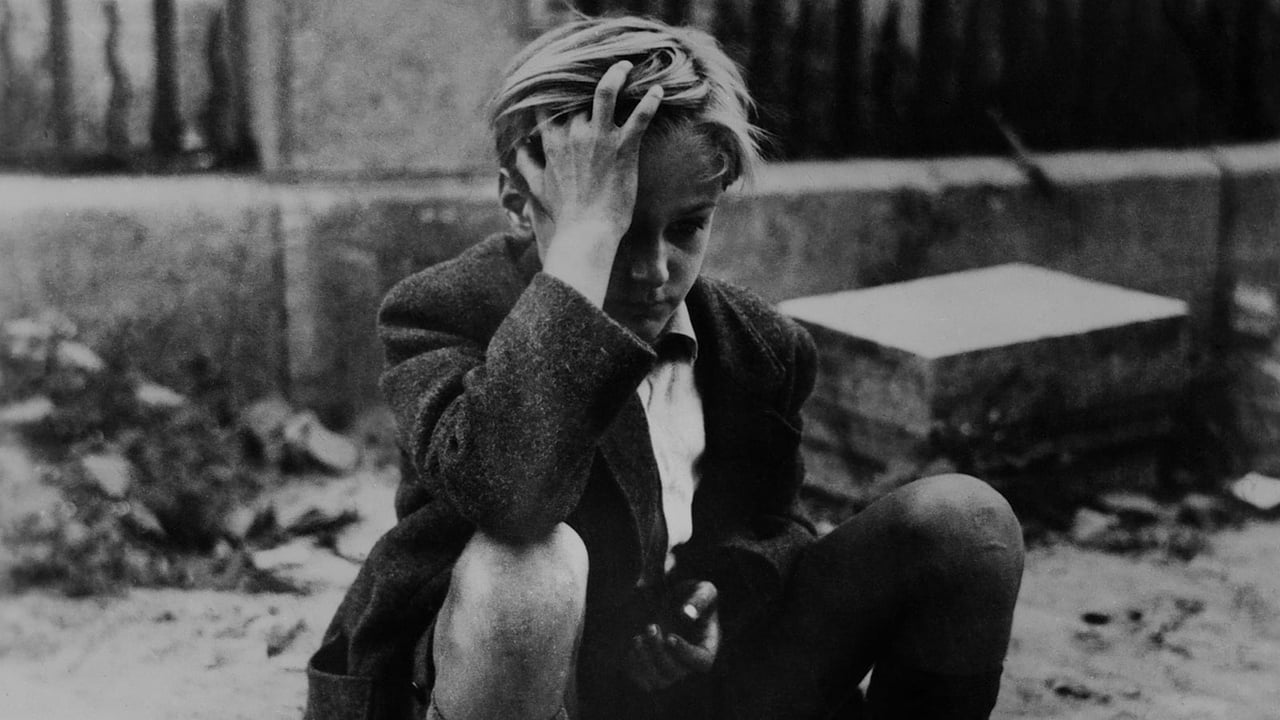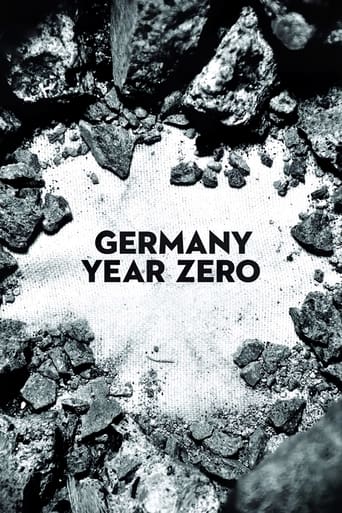

it is the right choice to admire it from the artistic perspective. but this represents one of many options. and, maybe, the useful way to discover this special film is the reflection of near reality. not only in the context of the WW II. because the message remains painful because it is a slice of contemporary reality. because the purposes - survive and need to impose the rules against society rules is the same. nothing different. nothing out of well known forms. and this does a gem of neo-realism more than a good example of cinema. but support for see , in profound manner, the near every day reality. to understand. the war, the survive, the situation of a boy among the shadows of war, the meanings of year zero for the conflict zones, the hope as more than noble emotion.
... View MoreGermany, Year Zero is the third installment in famed director Roberto Rossellini's war trilogy which began with Rome Open City, followed by Paisan. While the first two films were set in Italy, Rossellini filmed this one in bombed out Berlin and cast largely local, non-professional actors giving the narrative a heady verisimilitude. When they began shooting, the screenplay consisted of only 15 pages; eventually, through improvisation, Rossellini completed the film in a very compact 1 hour and 15 minutes.Rossellini cast Edmund Meschke, an 11 year old acrobat from the circus, to play the part of his protagonist, Edmund Kohler. Meschke bore a striking resemblance to Rossellini's recently deceased son, Romano. Rossellini's story reflects what was going on in Germany after World War II. It's not a pretty picture with multiple families assigned by the Housing Authority to live in cramped tenements. The black market is thriving and everyone is desperate to purchase small items that might make their life slightly more comfortable. Rossellini illustrates this when he depicts the owner of Edmund's apartment building, Mr. Rademacher, instructing Edmund to sell a scale for cash. But Edmund is ripped off by a man on the street who trades the naïve boy a couple of unappetizing cans of low grade meat instead.Edmund and the men in his family bear the scars of Germany's defeat. Edmund's father, Mr. Kohler, a veteran of World War I, is now bedridden and bemoans the fact that he's become a burden to the family. Mr. Kohler concedes that he knew the Nazis were bad as they rose to power, but like others of his generation, did nothing out of fear or indifference. Worse is Edmund's older brother, Karl-Heinz, who fears he might be arrested as a war criminal since he fought in the Army to the bitter end. Failing to register with the authorities leaves the brother without a ration card, placing an additional burden on the family. Eva, the older sister, at least refuses to become a prostitute but scrounges for cigarettes by going out with American soldiers.Rossellini does very well in depicting the spectre of Nazism still hovering over a defeated Germany like a plague that never goes away. At one point a construction worker utters on the street that we were once "proud National Socialists" but now we're "just Nazis." When Edmund runs into his former teacher, Henning, who is still a disciple of Hitler, it also becomes apparent that the man is a pedophile who has young Edmund in his sights. The now hardened Edmund takes Henning's admonitions to sacrifice the weak so that the strong can survive literally.For Rossellini, the Hitler Youth is alive and well, as Edmund decides to poison his father--who indicates he would like to commit suicide but does not have the courage to do so. After his father dies, Edmund returns to Henning who claims he never told the boy to kill his father and now wants nothing to do with him as he fears he might be implicated by the authorities for egging the boy on.Rossellini's denouement unfortunately is weak. He has Edmund jump off a building as he watches the hearse pick up his father's body across the street. Edmund becomes a symbol of the Nazi legacy and his "sacrifice" represents punishment for the German people in general—it is the "sins of the fathers" that corrupt a mere child who is unable to reconcile the hatred imprinted upon him with the contrasting true feelings of love for his own father.There is also the question whether Edmund, who appears to have accepted the Nazi philosophy (even at such a precocious age), would actually go ahead and kill himself. It might have been more interesting if the boy rejoined his family for the funeral and acted as if nothing happened. Instead of growing up haunted by nightmares, he could have easily morphed into a psychopath, committing crimes in the new Federal Republic of West Germany or its more sinister counterpart in the East.
... View More***SPOILERS*** Italian director Reborto Rossellini's film depicting post WWII Germany that was a living hell for the German people who survived the war. It's been estimated that as much as 10 million Germans died,mostly from starvation and disease, during the five years after the German surrender in May 1945. A shocking number which was almost if not more then those who died during the entire length,some six years, of WWII. It's Berlin Germany in the Summer of 1947 and life is hell for the German people who live there. Bearly surviving and with death and starvation staring them in the face many Berliners have to steal get involved in the black market as well as prostitute themselves in order to get food and medicine to survive. The Kohel family is one of many whom the movie "Germany Year Zero" focuses on.With the head of the family Mr. Kohler,Ernst Pittschau, practically on his death bed it's up to his two sons 13 year old Edmund, Edmund Meschke, and 25 year old former Afrika Corps infantryman Karl-Heinz, Franz-Otto Krugr, to bring home the bacon. There's also Eva Kohler, Ingetraud Hinez, who hangs out at the city's bars and nightclubs frequented by US and UK servicemen in order for them to buy her not only a drink but a square meal that she can take home and share with her on the verge of starving to death family.With Karl-Heinz afraid to get a ration card and work permit in fear that his past as a German soldier who didn't surrender at the end of the war, that ended two years earlier, would be reviled and have him sent to a POW camp it's up to Edmund to go out and find work to support his family. It's Edmund's former teacher Herr Henning,Erich Guhne, who gets Edmund involved in the black market as well as puts Nazi or Darwinian like ideas, the survival of the fittest, into the young and impressionable German youths head that in the end turn out to be fatal for both him and his sickly dad Mr. Kolher. It's only later that Herr Henning realized what he did and tried to put the entire blame on Edmund who was just, like the Nazi leadership at the Nuremburg Trial claimed, following orders!***SPOILERS*** It was Edmund who thought that he was doing his near dead father a favor by slipping poison in his tea and putting him out of his misery as well as life who ended up paying the ultimate price for his action. By him jumping off a bombed out Berlin building to his death at the conclusion of the movie thus leaving the cruel world that he finds himself in as well as his remaining family members behind.P.S It was German first time actor Edmund Meschke's striking resemblance to the movie director Roberto Rossellni's recently deceased son Romano, who died in 1946 of appendicitis, that got him the leading part in the movie. In fact the film was dedicated to Rossellini's son in its ending credits.
... View Morea story of war. ruins. poverty. angry. black market. ruins. and a boy. the story of Edmund is gray and not complicated. support for his family, victim of time, instrument of a teacher, piece in a blind struggle, without any sense of existence, part of confuse vision about values, it is , in same measure, victim and butcher. his butcher. the film is like a knife edge. cold,precise, impersonal. a city and its people. crumbs of war and slices of hate. seeds of a new world. and a lot of problems. a testimony. a picture. a neo-realistic movie. a verdict in which Rosellini includes pieces of lost universe. a manifesto, a silence moment, a trip in womb of a present past. because Berlin, this Berlin, is, in same measure Sarajevo of 1995 or Belgrad of 1999, a town from Rwanda or a place from Irak in 2003.
... View More